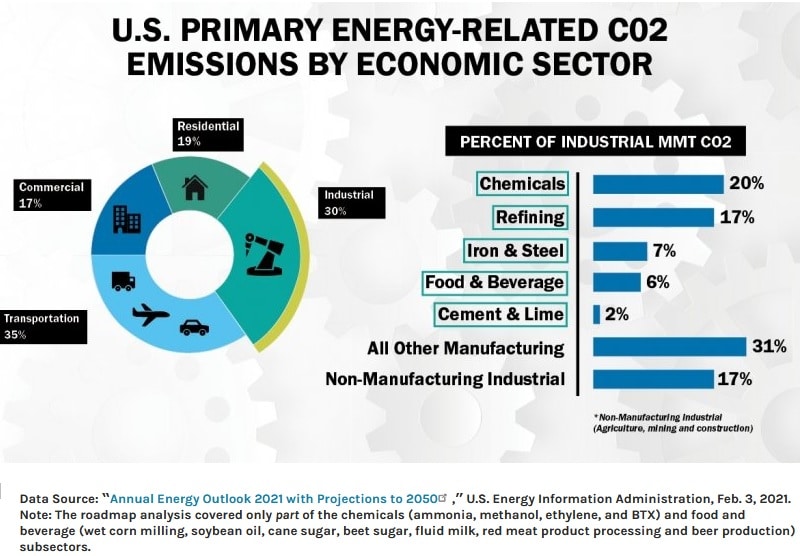U.S. Energy Department Lays Out decarbonization Roadmap for Industrial Sector

The U.S. Energy Department on Sep. 7 released a comprehensive roadmap identifying four key pathways – energy efficiency, electrification, use of low-carbon energy resources, and carbon capture – to decarbonize the industrial sector. The roadmap encourages the use of nuclear energy for heat and electricity, renewables, clean hydrogen, and biofuels. The report underscores the importance of reducing emissions across five industry segments, iron and steel, cement and concrete, food and beverage, chemical manufacturing, and petroleum refining.
The roadmap is the next major step to decarbonization by laying out how the different players in the industrial sector can develop tailored approaches to scale up the existing technology and invest in applied research and development for next-generation technologies, according to the department.
The four technology pathways include a push for industrial electrification technologies that include producing process heat from electric heat pumps that use electricity from both grid and onsite renewable energy sources. A smart manufacturing and advanced data analytics initiative are also considered as the most cost-effective solution for near-term greenhouse gas emissions reduction. The roadmap also calls for fuel switching from fossil to low-carbon fuels, feedstocks, and energy sources, which include using low and no-carbon fuel and feedstocks such as green hydrogen, biofuels, and bio-feedstocks like algae. The initiative’s final pathway is carbon capture, utilization, and storage, which includes capturing and sequestering carbon at permanent geologic storage sites, as well as developing mechanisms to use captured CO2 to produce new materials.
The industrial sector is among the most difficult to decarbonize and accounted for one-third of all domestic greenhouse gas emissions in 2021. The five segments identified by the roadmap account for over 50 percent of all energy-related CO2 emissions in the industrial sector.
The department also announced a $104 million funding opportunity for advanced industrial decarbonization technologies. The funding is backed by the 2021 Infrastructure Investment and Jobs Act and builds on the $10 billion in tax credits for clean energy manufacturing contained in the Inflation Reduction Act, in addition to the $5.8 billion for industrial facilities.
The funding opportunity announcement for the Industrial Efficiency and Decarbonization program focuses on the four industrial decarbonization pathways where decarbonization technologies could result in the maximum impact. The application date for funding is Dec. 20, 2022.
EnerKnol Pulses like this one are powered by the EnerKnol Platform—the first comprehensive database for real-time energy policy tracking. Sign up for a free trial below for access to key regulatory data and deep industry insights across the energy spectrum.
ACCESS FREE TRIAL